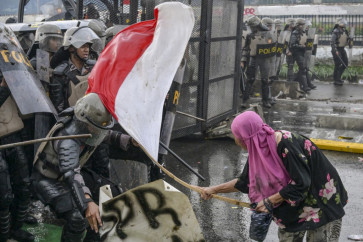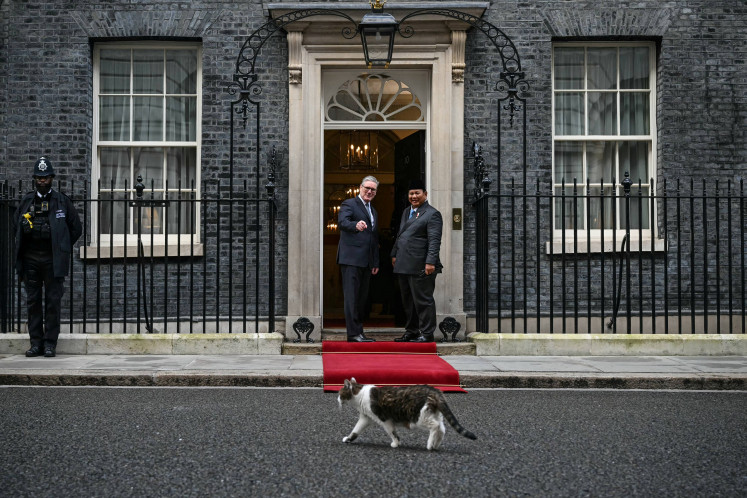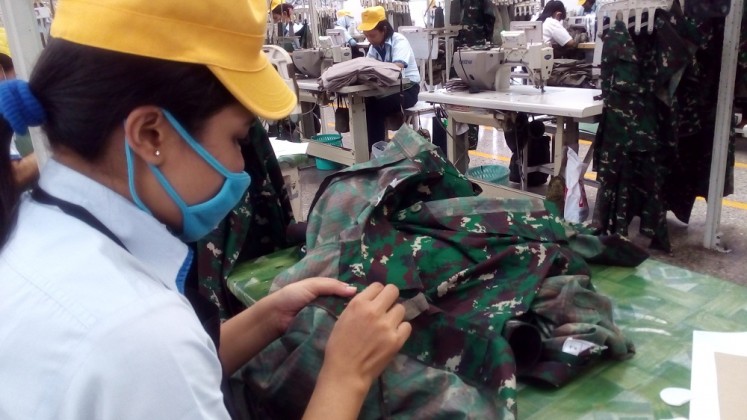Popular Reads
Top Results
Can't find what you're looking for?
View all search resultsPopular Reads
Top Results
Can't find what you're looking for?
View all search resultsWhy we need to support Kiat Esemka, Jokowi and nationalism
The Indonesian car industry sector has quite a promising outlook
Change text size
Gift Premium Articles
to Anyone
T
he Indonesian car industry sector has quite a promising outlook. The Indonesian Automotive Industry Association (Gaikindo) estimates that 880,000 units were sold in 2011, beating its target of 850,000 units, and projected that 950,000 units would be sold in 2012.
Unfortunately, the nation’s nascent car industry cannot take advantage of increased sales numbers. Until now, so-called national cars have not been able to develop in Indonesia. There have been several contenders — such as the Komodo, the Wasp, the GEA, the Marlip, the Maleo, the Wakaba and the Timor — but none has received serious attention from the government.
Suddenly, however, the Kiat Esemka made headlines after Joko “Jokowi” Widodo, the mayor of Surakarta, Central Java, announced that a car assembled by vocational high school students would be his official vehicle, instead of a branded luxury vehicle made by a famous manufacturer.
The Kiat Esemka’s rise to fame — many have deemed it a potential ”national car” — motivated a fair number of skeptics and cynics to comment. Others hope that the Kiat Esemka will meet with a fate different from its predecessors. However, as the vehicle recently flunked its emissions test, can we rest our hopes with the Kiat Esemka — or with Jokowi?
Jokowi was apparently ready for the vehicle’s failure. Without pleading for pity or blaming others, Jokowi even encouraged the Kiat Esemka manufacturing team not to get upset or to be shocked by the results, but immediately correct any deficiencies.
The mayor did not stop there. Jokowi then explored the possibility of cooperating with Germany by inviting the German ambassador to see the Kiat Esemka’s manufacturing process. As a result, technical assistance and training will be provided by a German car factory.
Before making headlines with his support of the Kiat Esemka, Jokowi was already popular for reforming the local bureaucracy. Jokowi, who evinces an attitude of simplicity, is widely respected by Surakartans.
Among his achievements are an increase in investment in Surakarta, the development of urban infrastructure, improved education and the revitalization of traditional markets, such as in the relocation of secondhand good vendors from the Banjarsari Garden area to other sites without incident.
Further, Jokowi defended local traditional markets, bucking higher authorities and daring to oppose their plans to build a modern market in the city. He also developed a rail transportation system — the Batara Krishna Railbus.
Jokowi has made many achievements as a mayor. But to realize the birth of a national car will be a real challenge for him. To avoid failure, there are three things that the manufacturers of the Kiat Esemka and Jokowi must pursue.
First, they should never give up due to failure. They must continue to improve and innovate.
Botching a first emissions test is normal. Leading car manufacturers have had many such failures. It is not an end point, but part of the process.
The important thing to do is to immediately correct deficiencies. Special attention, however, must be paid to intellectual property and copyrights. Everything should be clear from the beginning.
Second, we must not be afraid to dream of developing energy-efficient cars, such as electric cars. It is the future.
Indonesia’s fuel consumption is increasing, while oil production is dwindling. This is very alarming.
Indonesia should not allow its technological dependence on other nations increase. The Kiat Esemka team must also ensure its plans accord with the government’s automotive and energy roadmaps. Over time, the nation’s hopes might rest with the Kiat Esemka.
Third, the team must stay focused with all the action plans that have been made. Synergies and coordination with various parties should be further improved.
Imagine the number of new jobs that would be created for Indonesians if the Kiat Esemka was a success. By displaying determination, sincerity and savvy, the Kiat Esemka will attract investors without additional effort. Do not be overbearing or do things on the cheap. The Kiat Esemka team must simply do its best.
Similarly, the government has three things it must do to make the Kiat Esemka a success.
First, it should harness the momentum of the Kiat Esemka by giving support. Many countries started their national car projects in cooperation with well-established car manufacturers. Japan, Korea and Malaysia, for example, went further and gave their full support.
Second, the government should provide technical design assistance for the Kiat Esemka. Do not let it compete freely with established car manufacturers, but don’t spoil it, either.
The most important and complex part of any car is its internal combustion engine is the technology of its engine block. Do not be ashamed if, for instance, the Kiat Esemka imitates other products in its early stages. Japan, a giant in the automotive world today, initially started by improved and innovated.
Third, the government should instill a sense of pride in the Indonesian people to use our own products as a form of nationalism. What has been created by the nation, should be appreciated by the nation, without reproach or insult. If we do not ever have the will, we will forever depend on the technology of other countries.
Finally, we need real and serious action, as already demonstrated by the Kiat Esemka team and Jokowi. Whether the Kiat Esemka is able to prove itself as a national car — or whether there is nationalism behind the Kiat Esemka — only time will tell.
The Kiat Esemka team must continue to show resilience. We, as a nation, must support their initiative.
The writer is a consultant and a researcher at the Solar Energy Research Group at the Kanagawa Institute of Technology, Japan.










